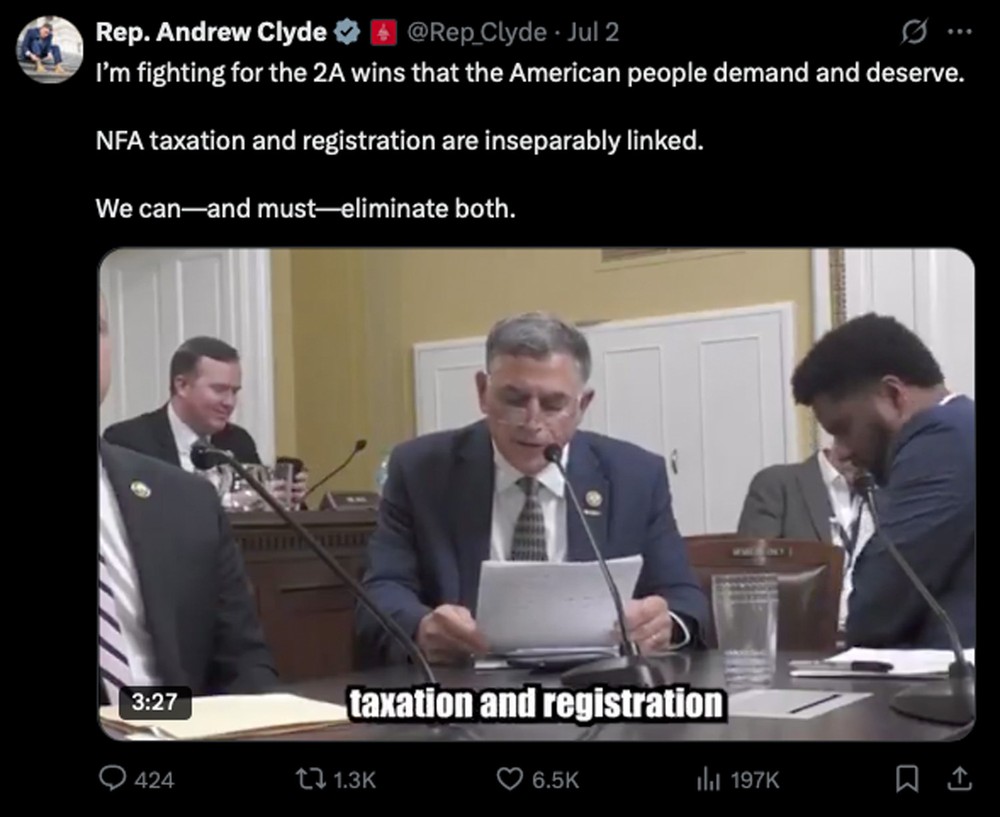The fight to modernize suppressor laws and reduce NFA burdens hit a turning point in 2025. With the passage of H.R. 1, nicknamed the “One Big Beautiful Bill,” gun owners saw major changes.
Here’s a clear, chronological breakdown of what happened and what it means for the 2A community.
Hearing Protection Act 2025 & H.R.1 Changes for Suppressors and SBRs
- H.R.1 (“One Big Beautiful Bill”) passed, signed into law July 4, 2025, it includes significant changes for gun owners.
- $200 tax stamps for suppressors, SBRs, SBSs, and AOWs reduced to $0 starting January 1, 2026.
- NFA process and registry remain—for now. Forms, fingerprints, and approvals still required.
- Full deregulation (HPA & SHORT) was blocked by the Senate Byrd Rule.
- Senate compromise: Free tax stamps, but not full removal from the NFA.
- New legal opportunities: Zeroing out the tax opens the door to challenge the NFA in court.
- We're suing: There is precedent for $0 taxes being unconstitutional–we're going to fight to repeal the NFA
Table of Contents
- H.R.1 and the Return of the Hearing Protection Act (May 2025)
- House Passes H.R.1 with HPA Language (May 2025)
- Senate Adds SHORT Act Provisions (June 2025)
- HPA and SHORT Get the “Byrd Bath” (June 2025)
- $0 Tax Stamp Compromise (June 2025)
- Senate Passes H.R.1 (July 1, 2025)
- House Reconvenes for Vote (July 2, 2025)
- House Passes HR1 (July 3, 2025)
- President Trump Signs HR1 (July 4, 2025)
- Next Steps: A Legal Door Opens
- What This Means for Gun Owners
- Stay Involved
H.R.1 and the Return of the Hearing Protection Act (May 2025)
H.R. 1 was introduced in early 2025 as a broad budget reconciliation bill. Crucially for gun owners, it included Hearing Protection Act language that would remove suppressors from the National Firearms Act (NFA) and place them under the Gun Control Act (GCA). That would mean no tax stamp, no fingerprints, no CLEO notification, and no registration—just a standard NICS background check.
It also proposed to zero out the $200 tax stamp on suppressors.
Early drafts of H.R. 1 raised red flags by including a federal public land sell-off provision, which gun owners and hunters opposed. That piece was ultimately removed after public pressure.
House Passes H.R.1 with HPA Language (May 2025)
Thanks to pressure from grassroots gun owners and support from the American Suppressor Association and Gun Owners of America, the HPA language stayed in the final House version. On May 22, 2025, the bill passed by a narrow 215–214 margin.
BREAKING: The House PASSES the amended reconciliation bill — including the FULL REMOVAL of suppressors from the NFA — by a 215-214 vote!
— American Suppressor (@AmSuppressor) May 22, 2025
The is a HUGE WIN for suppressors, 2A rights, and freedom!! pic.twitter.com/zykAbvKLMZ
The suppressor deregulation section—Section 2 of H.R.1—was described as a "monumental victory" by NRA-ILA.
Senate Adds SHORT Act Provisions (June 2025)
In June 2025, the Senate took things further by adding SHORT Act provisions to also deregulate SBRs, SBSs, and AOWs. Second Amendment advocates were energized.


Pushback from anti-gun Democrats like Sen. Elizabeth Warren and Sen. Chuck Schumer ramped up quickly. Opponents argued the changes weren’t budgetary and didn’t qualify under reconciliation.
HPA and SHORT Get the “Byrd Bath” (June 2025)
The Byrd Rule is named after Senator Robert Byrd of West Virginia, who introduced it to prevent non-budgetary policy changes from being included in budget reconciliation bills. It lets the Senate Parliamentarian – an unelected official – remove provisions that don’t directly affect federal spending or revenue. If a proposal is mostly policy, not budget, it gets cut.
On June 27, the Senate Parliamentarian ruled the HPA and SHORT Act provisions violated the Byrd Rule. This struck full deregulation from the bill—but Republicans responded by drafting a fallback.
Senate Replaces Deregulation with $0 Tax Stamp Compromise (June 2025)
After their original provisions were stripped by the Byrd Rule, Senators inserted new language keeping NFA registration in place but eliminating the $200 tax stamp for suppressors, SBRs, SBSs, and AOWs. Machine guns and destructive devices were not included in the updated language. This compromise kept some pro-2A language alive: free tax stamps going forward.
Senate Passes H.R.1 (July 1, 2025)
Despite the setback, the revised bill passed the Senate 51–50. Vice President JD Vance cast the tie-breaking vote. Republicans Thom Tillis, Rand Paul, and Susan Collins opposed the bill, citing different objections.
House Reconvenes for Vote (July 2, 2025)
HR1 went back the house for final approval before going to President Trump’s desk, but it wasn’t as smooth as some folks thought it would be.
The bill was immediately met with amendments, most notable for gun owners was Rep Clyde’s appeal to re-add the full deregulation language. This amendment was ultimately rejected by Congress.


Also, other issues threatened delay, because of Independence Day many House members traveled out of town and had to be recalled for the vote.
House Passes HR1 (July 3, 2025)
After scrambling to get representatives back to DC, back-and-forth to secure key “yea” votes, flipping representatives positions, and even conga lines on the house floor, Republicans gathered the appropriate votes to pass the “Big Beautiful Bill” including the zero dollar tax stamp
The final House approval of H.R. 1 passed 218–214. Two Republicans voted no:
- Rep. Thomas Massie (R–KY)
- Rep. Brian Fitzpatrick (R–PA)
Next Steps: A Legal Door Opens
This $0 tax stamp compromise has created a legal vulnerability for the NFA.
There is only one example for a federal tax being set to $0—the Affordable Care Act’s individual mandate.
In NFIB v. Sebelius, the Supreme Court upheld the mandate as a tax. But when Congress later reduced that tax to $0, the court ruled that the mandate could no longer be justified under Congress’s taxing power and was therefore unconstitutional.
That same legal logic applies here. If there’s no longer a revenue-generating tax, can the suppressor registry and approval process under the NFA still stand? No.
At Silencer Shop, we believe this opens the door to challenge the constitutionality of the NFA as it applies to suppressors, SBRs, SBSs, and AOWs. Silencer Shop Foundation, and industry partners, are banding together to launch a lawsuit targeting the NFA.
This fight isn’t over. In fact, it may just be entering its most important chapter.
Stay Up-To-Date on What's Coming Next:
What This Means for Gun Owners
- Free Tax Stamps Start January 1, 2026: Suppressors, SBRs, SBSs, and AOWs will still go through the NFA process, but without paying the $200 tax.
- Public Lands Preserved: Early fears of public hunting land being sold off were addressed before final passage.
- ATF Forbearance Possible: While not confirmed, there are rumors the ATF may allow free submissions before the effective date.
- Registry, Forms, and Wait Times Stay—for Now: This isn’t full deregulation. Fingerprints, eForms, and approvals are still required.
- NFA Reform Momentum is Real: Although the Byrd Rule blocked full repeal, the successful $0 stamp opens an opportunity to attack the NFA in the legal system.
- We’re Gonna Sue: The NFA has discriminated against gun owners for nearly a century, its time for it to end. We’re launching a legal attack to repeal the NFA.





